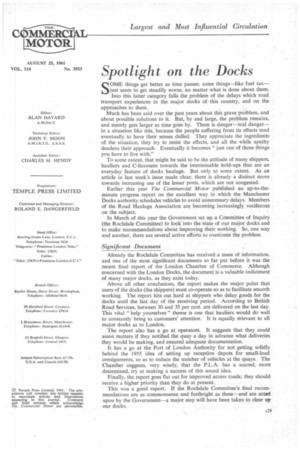Spotlight on the Docks
Page 31

If you've noticed an error in this article please click here to report it so we can fix it.
SOME things get better as time passes; some things—like fuel tax— just seem to get steadily worse, no matter what is done about them. Into this latter category falls the problem of the delays which road transport experiences in the major docks of this country, and on the approaches to them.
Much has been said over the past years about this grave problem, and about possible solutions to it. But, by and large, the problem remains, and merely gets larger as time goes by. There is danger—real danger— in a situation like this, because the people suffering from its effects tend eventually to have their senses dulled. They appreciate the ingredients of the situation, they try to resist the effects, and all the while apathy deadens their approach. Eventually it becomes "just one of those things you have to live with."
To some extent, that might be said to be the attitude of many shippers, hauliers and C-licensees towards the interminable hold-ups that are an everyday feature of docks haulage. But only to some extent. As an article in last week's issue made clear, there is already a distinct move towards increasing use of the lesser ports, which are not congested.
Earlier this year The Commercial Motorpublished an up-to-theminute progress report on the excellent way in which the Manchester Docks authority schedules vehicles to avoid unnecessary delays. Members of the Road Haulage Association are becoming increasingly vociferous on the subject.
In March of this year the Government set up a Committee of Inquiry (the Rochdale Committee) to look' into the state of our major docks and to make recommendations about improving their working. So, one way and another, there are several active efforts to overcome the problem.
Significant Document , Already the Rochdale Committee has received a mass of information, and one of the most significant documents so far put before it was the recent final report of the London Chamber of Commerce. Although concerned with the London Docks, the document is a valuable indictment of many major docks, as they exist today.
Above all other conclusions, the report makes the major point that users of the docks (the shippers) must co-operate so as to facilitate smooth working. The report hits out hard at shippers who delay goods for the docks until the last day of the receiving period. According to British Road Services, between 30 and 35 per cent. are delivered on the last day. This vital "help yourselves" theme is one that hauliers would do well to constantly bring to customers' attention. It is equally relevant to all major docks as to London.
The report also has a go at operators. It suggests that they could assist matters if they notified the quay a day in advance what deliveries they would be making, and ensured adequate documentation.
It has a go at the Port of London Authority for not getting solidly behind the 1955 idea of setting up reception depots for small-load consignments, so as to reduce the number of vehicles at the quays. The Chamber suggests, very wisely, that the P.L.A. has a second, more determined, try at making a success of this sound idea.
Finally, the report goes flat out for improved access roads; they should receive a higher priority than they do at present.
This was a good report. If the Rochdale Committee's final recommendations are as commonsense and forthright as these—and are acted upon by the Government—a major step will have been taken to clear up our docks.




















































































































